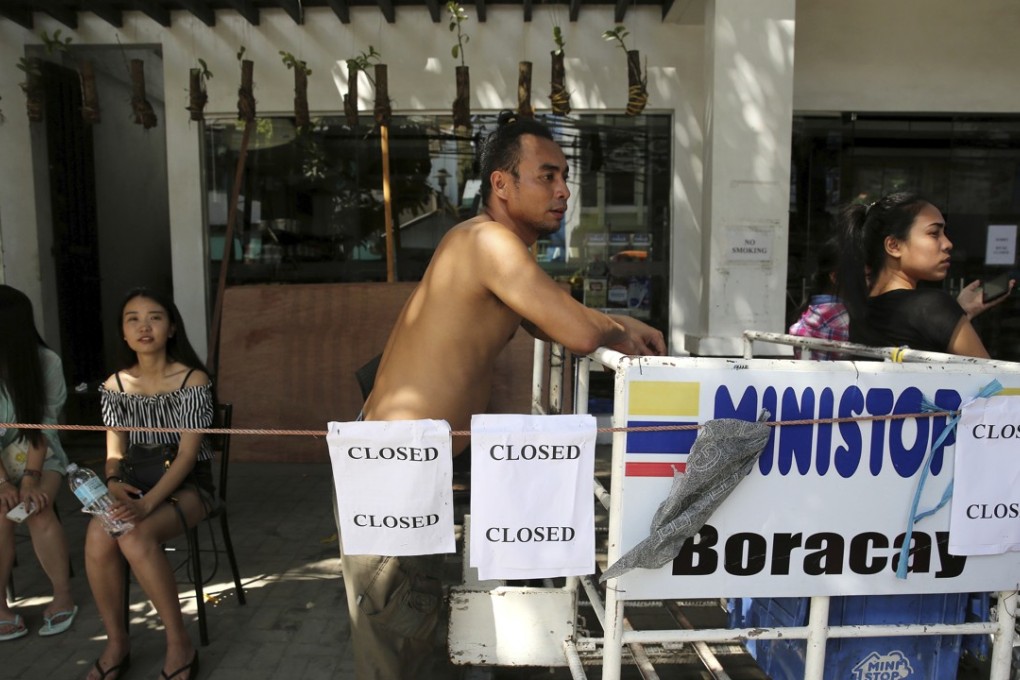Advertisement
Is there more to President Rodrigo Duterte’s Boracay closure and drug war than meets the eye?
Mark R. Thompson says low-profile dealings with a Chinese company, selective prosecution of drug traffickers and targeting of political enemies suggest there may be less wholesome (and less populist) reasons for the Philippine president’s moves
Reading Time:4 minutes
Why you can trust SCMP

With Boracay island’s white sands emptied of tourists after a six-month government-ordered closure late last week, the world again took notice of Philippine President Rodrigo Duterte’s populist leadership style: melodramatic and personalised, with little concern for the consequences.
Advertisement
The shutdown played well to his fan base as another demonstration of his iron will to cleanse the country of its social ills. Promising to deal with Boracay’s “smelly waters” due to untreated sewage and other environmental hazards, Duterte again effectively portrayed himself as a strongman willing to stand up to corrupt local officials and dodgy businesses.
Top Philippine tourist spot Boracay closes under high security
But his surprise decision largely ignored the local fallout, with 30,000 jobs affected in an island tourist trade worth over US$1 billion last year (with only limited compensation offered) while deflecting from his own political problems (revelations last February that the International Criminal Court had begun a preliminary investigation of his bloody “war on drugs” that has left thousands dead in his less than two years in office).
The way Duterte has dealt with Boracay’s problems is part of a larger pattern. He invokes graphic images to justify drastic decisions. He portrayed Boracay as a “cesspool” that must be closed. His 2016 presidential campaign was largely run on the narrative that drugs were ruining people’s lives and threatening to destroy the nation, with Duterte urging Filipinos to murder users and dealers whose dead bodies would fill Manila Bay until the fish grew fat. When rage is sufficiently aroused, extreme solutions become acceptable, even if the cost is lost jobs or even extrajudicial killings.
Sun, sea, sand, Swat team: police prepare to close Boracay
Duterte often announces his controversial decisions in speeches, usually before he gives marching orders to his cabinet. He revealed his Boracay shutdown decision in a February 9 speech, surprising his audience and the nation and leaving his cabinet secretaries scrambling to find a way to implement the order within a very short time frame.
Duterte’s decision to close Boracay is also an example of what University of Pennsylvania academic Denise van der Kamp terms “blunt force” regulation, typical of many developing countries, including China. It takes an all-or-nothing approach to a problem caused by non-enforcement of rules due to local corruption but in a manner that impacts equally those who obeyed regulations and those who did not.
As Boracay shuts for six months, spare a thought for the locals
In the case of Boracay, Philippine economist Solita Collas Monsod estimates that nearly two-thirds of hotels and other businesses complied with environmental regulations, but all establishments have been closed whether they played by the rules or not. Instead of working to improve the enforcement of existing regulations to deal with violators, Duterte chose a top-down solution, shutting down the entire island, leading to mass lay-offs and forgone revenues.
Boracay closure highlights ugly side to tourism boom in Southeast Asia

Advertisement